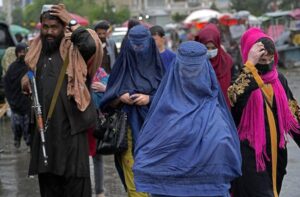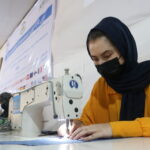In response to the government’s morality law, UN Women has stated that the administration must immediately repeal its “anti-women” legislation and adhere to international commitments.
In a published statement, the organization expressed deep concern over the recent approval of a new law by the current Afghan government, which imposes extensive restrictions on personal behavior, effectively excluding women from public life and granting extensive enforcement powers to morality police.
The statement continued that this new law specifically targets women and imposes a series of heavy restrictions on them. UN Women noted that women are now required to cover their entire bodies and faces in all public spaces, and their voices are prohibited in public environments.
The statement emphasized that these laws have effectively deprived women of their presence and participation in society, pushing them to the margins.
Citing its own data, UN Women reported that these restrictions have had dire consequences for the lives of women and girls in Afghanistan. Expressing serious concern over this situation, the organization called for the immediate repeal of these repressive laws and urged the current government to uphold international commitments and guarantee the full rights of Afghan women and girls.
The organization also committed to continuing efforts to support women’s rights in Afghanistan in collaboration with its partners, striving for the realization of their full rights.
According to this organization, over the past three years, the current government has issued more than 70 restrictive decrees affecting the lives and work of women, leading to gross violations of their human rights.
UN Women asserted that these restrictions have had a detrimental impact on the lives of women in Afghanistan.
This comes as Mullah Hibatullah Akhundzada, the leader of the interim government, recently ratified the “Morality and Vice Prevention Law,” which is now in effect. This law includes a preamble, four chapters, and 35 articles.
Notably, Article 13 of this law, which contains eight clauses, is dedicated to “Rules Regarding Women’s Hijab.” According to the announced law, the first clause states that “the covering of a woman’s entire body is mandatory,” while the second states that “hiding a woman’s face due to fear of temptation is necessary,” and the third emphasizes that “the voice of women (singing songs, reciting poetry, and reading in gatherings) is considered ‘awrah’ (private).”
Additionally, the fourth clause specifies that “women’s clothing should not be thin, short, or tight,” while the fifth states that “Muslim women are obligated to conceal their bodies and faces from non-mahram men.” The sixth clause asserts that “the covering of Muslim women and righteous women from non-believing and immoral women is obligatory due to fear of temptation.”
This law has also sparked reactions. Women and girls in Afghanistan symbolically protested against this law and the classification of women’s voices as ‘awrah’ by softly reciting poems and verses.
Despite this, officials from the current government have labeled international reactions to the approval of this law as “insolence.”













